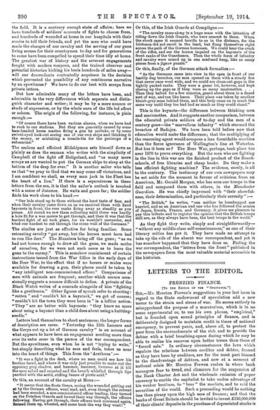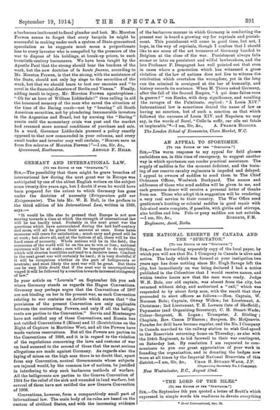LETTERS TO THE EDITOR.
FRENZIED FINANCE.
[TO THE EDITOR Or TEE " SPECTATOR :1 Sin,—Mr. Moreton Frewen's suggestions in your last issue in regard to the State endowment of speculation add a new terror to the strain and stress of war. He seems entirely to misapprehend the purpose of a moratorium, which is in no sense experimental or, to use his own phrase, "empirical," but is founded upon sound principles of finance, and is deliberately designed to maintain credit in times of national emergency, to prevent panic, and, above all, to protect the poor from the encroachments of the rich and to provide the debtor with a brief breathing-space during which he may be able to realize his reserves upon better terms than those of " forced sale." In ordinary circumstances the laws which regulate the relations between creditor and debtor, framed as they have been by creditors, are for the most part biassed to the disadvantage of debtors, and now at a moment of national crisis Mr. Moreton Frewen rushes in where bank managers fear to tread, and clamours for the suspension of the Bank Charter Act and the wholesale emission of paper currency to enable the capitalist to take undue advantage of his weaker brothers, to " bear " the markets, and to raid the securities of the world. Such a proceeding would be nothing less than piracy upon the high seas of finance; and that the banks of Great Britain should be invited to invest £150,000,000 of their clients' deposits in the purchase of depreciated stocks is
a barbarous incitement to fiscal plunder and loot. Mr. Moreton Frewen seems to forget that every bargain he might be successful in making under such a system of State-guaranteed speculation as he suggests must mean a proportionate loss to every investor who is compelled by the pressure of the war to dispose of his holdings, at break-up prices, to such twentieth-century buccaneers. We have been taught by the Apostle Paul that the strong should hear the burdens of the weak, but the new doctrine of la haute finance, according to Mr. Moreton Frewen, is that the strong, with the assistance of the State, should not only lay siege to the securities of the weak, but that we should learn to loot our enemies and " to revel in the financial disasters of Berlin and Vienna." Finally, adding insult to injury, Mr. Moreton Frewen apostrophises : " Oh for an hour of William Lidderdale l" thus calling in aid the honoured memory of the man who saved the situation at the time of the Baring crash—not by " bearing " all South American securities, not by plundering innumerable investors in the Argentine and Brazil, but by nursing the " Baring " assets until the momentary crisis was past and the market bad resumed more normal conditions of purchase and sale. In a word, Governor Lidderdale pursued a policy exactly opposed to that now commended in your columns, and every small trader and investor may well exclaim, "Heaven save us from five minutes of Moreton Frewen !"—I am, Sir, &c.,



































 Previous page
Previous page